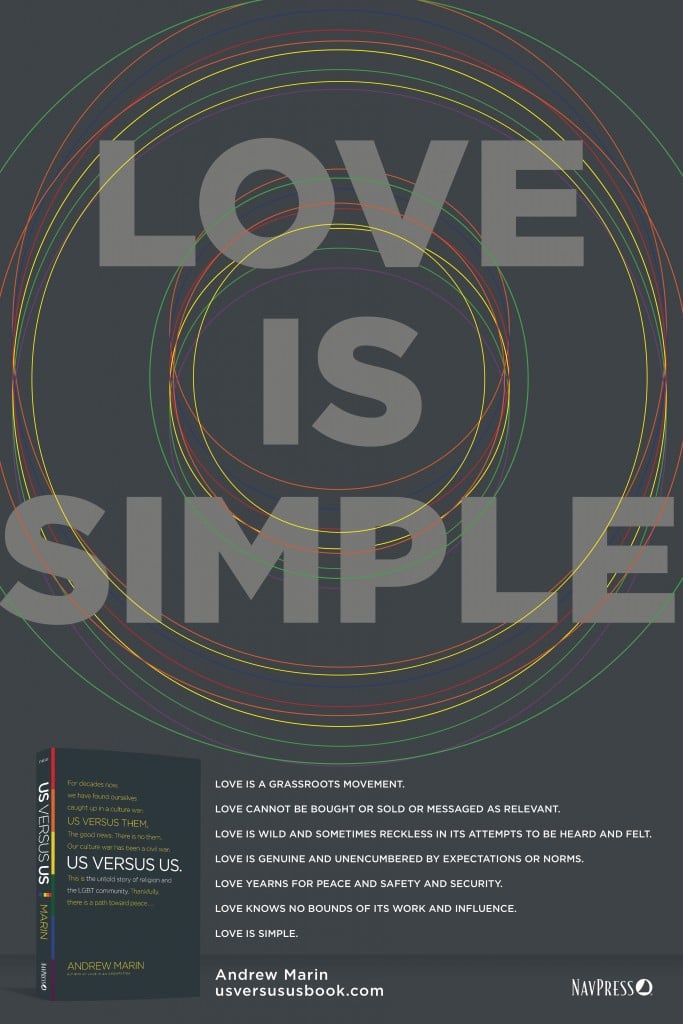The following post is by Jason Bilbrey, our Director of Pastoral Care here at The Marin Foundation. You can read more from Jason at his blog, www.jasonbilbrey.com or follow him on Twitter at @JasonBilbrey.
Does the Bible support or prohibit same-sex relationships?
This question behind a three-part series, “The Bible and Homosexuality,” that we’ve put on as part of our biweekly Living in the Tension gatherings this summer. We started three weeks ago with a presentation from Matthew Vines, author of God and the Gay Christian, who laid out his argument for the Bible’s support of same-sex relationships. Last week, we heard from blogger and speaker Julie Rodgers, who offered a more conservative interpretation of Scripture as a celibate gay Christian.
We’ll conclude the series this Monday with a discussion of both presentations, but I’m jumping the gun a bit today.
Here’s what I’ve learned from my friends, Matthew and Julie:
1. Civility in this conversation is refreshing and beautiful. Both Matthew and Julie began their respective lectures by praising and promoting the other. That just doesn’t happen in typical debates. They clearly and resolutely held to opposing viewpoints, but never did they frame the other as an opponent. There wasn’t a winner or loser. There wasn’t a sense of “us vs. them.”
In a conversation dominated by the language of “victories” and “defeats,” this was so refreshing.
2. It’s always more compelling to learn from someone who’s actually gay. Both Julie and Matthew will be the first to tell you they’re not experts in the field of biblical hermeneutics. Neither of them have doctorates in theology. But they do have something else which is often absent from this particular biblical debate: They have skin in the game. Being gay Christians Matthew and Julie are two people for whom the Bible’s answer to the question of same-sex relationships has very real and very life-altering ramifications.
This debate takes on a fresh perspective when it’s voiced by those for whom it’s personal. It’s scholarship presented with pathos. To paraphrase something that Matthew said, “Be wary of any discussion of same-sex relationships that does not include gay voices–especially policy-making discussions.”
3. The question of gender complementarity is really important. Does God’s creation of male and female indicate of some kind of strict, universal design for sexuality? That question, the whole idea of gender complementarity, is what the debate hinges upon. Our answer often becomes the lens through which we understand and interpret–among others–each of the six references to same-sex relationships in the Bible. It’s the critical point of contention between Julie and Matthew.
This isn’t a new discovery for me, really. I’ve been studying this for a few years now, but I came away from these two presentations with a renewed interest. Considering how central this idea of gender complementarity is to the debate, it warrants more attention than I’ve given it.
4. Five years of Living in the Tension has fostered an incredibly wise community. I was impressed with the roomful of gatherers nearly as much as I was with Matthew and Julie. The value at the heart of our Living in the Tension gatherings has always been listening. Here’s the thing about listening to five years worth of poignant stories and differing perspectives: you get good at it. The questions this group had for Julie and Matthew were deeply engaged and precise and articulate. They came from lived experience. They were sometimes challenging, but always generous.
This is no small thing. This conversation about the Bible and same-sex relationships is notorious for turning theological disagreements into personal attacks. But this community knew the important distinction between criticism and condemnation, argument and antagonism. I’m often bragging about these gatherings I help facilitate, but I’ve never been more grateful for my Living in the Tension friends.
So thanks, Matthew and Julie, for your honesty and courage! Thanks for teaching us with your words and your actions.
















